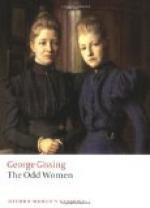Not many people visited this house. Every Wednesday evening, from half-past eight to eleven, Miss Barfoot was at home to any of her acquaintances, including her pupils, who chose to call upon her; but this was in the nature of an association with recognized objects. Of society in the common sense Miss Barfoot saw very little; she had no time to sacrifice in the pursuit of idle ceremonies. By the successive deaths of two relatives, a widowed sister and an uncle, she had come into possession of a modest fortune; but no thought of a life such as would have suggested itself to most women in her place ever tempted her. Her studies had always been of a very positive nature; her abilities were of a kind uncommon in women, or at all events very rarely developed in one of her sex. She could have managed a large and complicated business, could have filled a place on a board of directors, have taken an active part in municipal government—nay, perchance in national. And this turn of intellect consisted with many traits of character so strongly feminine that people who knew her best thought of her with as much tenderness as admiration. She did not seek to become known as the leader of a ‘movement,’ yet her quiet work was probably more effectual than the public career of women who propagandize for female emancipation. Her aim was to draw from the overstocked profession of teaching as many capable young women as she could lay hands on, and to fit them for certain of the pursuits nowadays thrown open to their sex. She held the conviction that whatever man could do, woman could do equally well—those tasks only excepted which demand great physical strength. At her instance, and with help from her purse, two girls were preparing themselves to be pharmaceutical chemists; two others had been aided by her to open a bookseller’s shop; and several who had clerkships in view received an admirable training’ at her school in Great Portland Street.
Thither every weekday morning Miss Barfoot and Rhoda repaired; they arrived at nine o’clock, and with an hour’s interval work went on until five.
Entering by the private door of a picture-cleaner’s shop, they ascended to the second story, where two rooms had been furnished like comfortable offices; two smaller on the floor above served for dressing-rooms. In one of the offices, typewriting and occasionally other kinds of work that demanded intelligence were carried on by three or four young women regularly employed. To superintend this department was Miss Nunn’s chief duty, together with business correspondence under the principal’s direction. In the second room Miss Barfoot instructed her pupils, never more than three being with her at a time. A bookcase full of works on the Woman Question and allied topics served as a circulating library; volumes were lent without charge to the members of this little society. Once a month Miss Barfoot or Miss Nunn, by turns, gave a brief address on some set subject;




